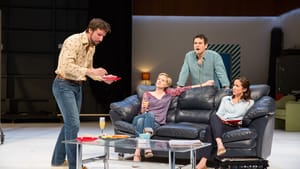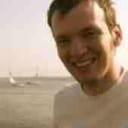Stay in the Loop
BSR publishes on a weekly schedule, with an email newsletter every Wednesday and Thursday morning. There’s no paywall, and subscribing is always free.
An intellectual's foray into matters of the heart
Stoppard's 'The Real Thing' at the Wilma

It’s hard to know exactly who to root for in The Real Thing, Tom Stoppard’s 1982 depiction of adultery among the theatrical classes.
We have Henry (Kevin Collins), a successful playwright with “a joke reflex” who lives his life with the detached wit of a Wildean rake. A nice sort of person to have at a dinner party, but with a nasty streak of casual cruelty to those he considers inferior.
Pretty much everyone else is an actor: There’s his wife, Charlotte (Karen Peakes), almost as good with a quip, his lover Annie (Suzy Jane Hunt), alluring despite a tendency toward limousine liberalism, and her husband Max (Dan Hodge), the only wholly sincere and kindhearted person in the play. Too bad he’s just as boring as he sounds.
The Real Thing is known as Stoppard’s first foray into matters of the heart, but it’s just as stuffed with intellectual delights as Rosencrantz and Guildenstern or his Coast of Utopia trilogy. It’s so chockablock with ideas that they practically crowd one another off the stage — mercifully, in the case of Stoppard’s half-baked criticisms of political commitment.
An exploration of character
But The Real Thing is mostly focused on a different type of commitment, and in that it is far more successful. The story is basically concerned with Henry’s character, peeling back the outer layers of practiced cool to reveal that there actually is a heart in there. The entire play hangs on him, and Collins is superb in the part.
Henry has a beautifully worded quip for every situation, which makes it all the more devastating when he’s reduced to a simple plea. It’s a joy to listen to him play with language and generally mock everyone around him. (I particularly enjoyed his rip on a poorly constructed play by a jailed activist: “It’s half as long as Das Kapital and only twice as funny.”) You can immediately see why Annie would find him so thrilling, especially in comparison to her earnest husband, and also why his cool, intellectual demeanor would be so utterly frustrating. An easy man to love, but not to live with.
Hunt’s Annie is a greater mystery, and not necessarily in a good way. She seems to be trailed by an enthusiastic train of male admirers, but her character is never really given the space to fully develop. It’s hard to say what draws the throngs of wooers besides Annie’s beauty. The occasions where we are allowed to see her a bit more clearly are fascinating, as in her explanation for an affair with a younger man: “I liked it, being older for once, in charge, my pupil.” But this is Henry’s story, not hers, which can be a problem. A play about love and infidelity (and how the latter does not necessarily destroy the former) would benefit from a more compelling relationship at its center. Instead, we mostly have a series of scenes where Henry dazzles us with dialogue while Annie gets annoyed at his snobbery, emotional distance, and easy confidence.
Nevertheless the discovery of Henry’s vulnerability is compelling enough. In the second scene, where Annie and Max visit the armed camp that is Charlotte and Henry’s marriage, which has a very Who's Afraid of Virginia Woolf vibe, he has an air of nonchalant invulnerability as he glibly indulges in extramarital chicanery. That façade is dented in The Real Thing’s second act, as he discovers just how much he has fallen in love with Annie and how much he can stand when it seems that he could become the cuckold.
The play’s other weakness comes in its too easy mockery of the anti-war and anti-nuclear movements of the 1980s, which were a real force in the United Kingdom at the time. It is also obnoxious that the jailed protester whom Annie is bent on freeing, the lower-class Scotsman Brodie, turns out to be just as loutish as the aloofly conservative Henry suspects he will be. Stoppard isn’t good at depicting working-class characters, preferring to write what he knows (intellectuals, artists, and the literati), but the play’s treatment of him feels particularly insulting.
With, of course, verbal gymnastics
The Wilma’s production is very fine, especially in the false set that Charlotte and Max inhabit in the opening scene, where they are starring in a scene from Henry’s latest play. (Both Hodge and Peakes do a wonderful job of hamstringing their acting abilities before shedding the stilted routine and letting their real talent come through in the second scene.)
But the real draw is the dialogue. It is hard to name a playwright who takes a greater pleasure in verbal gymnastics than Stoppard, and The Real Thing is, in a way, his critique of his own gift. It is too easy to say that Henry is a stand-in for Stoppard (who is a far kinder person, by all accounts, than his creation), although the playwrights do share a passion for elegant verbiage. The Real Thing clearly holds that talent in high esteem, but the play is not just a showcase for beautifully crafted language. Like Henry, it has a heart, even if it is just as well-concealed.
What, When, Where
The Real Thing. A play by Tom Stoppard. David Kennedy directed. Through June 22, 2014 at the Wilma Theater, 265 South Broad Street, Philadelphia. 215-546-7824 or www.wilmatheater.org.
Sign up for our newsletter
All of the week's new articles, all in one place. Sign up for the free weekly BSR newsletters, and don't miss a conversation.
 Jake Blumgart
Jake Blumgart